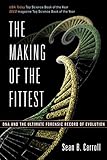This is especially interesting in view of the reduction of sense of smell over millions of years in the ancestral line of human beings. Before animals in the clade Primates developed trichromatic color vision, they distinguished fruits ripe enough to eat from fruits that were not mostly by smell. But after color vision improved, there was no longer selection pressure to maintain the sense of smell genes that gave the same information about food plants, and so random mutations gradually knocked out those genes. Comparative DNA analysis shows that human beings have descendant genes that were once used for accurate sense of many smells that human beings can no longer distinguish, but that sensory capacity was lost by genetic drift until lack of accurate sense of smell for many substances became fixed in the human population. A fascinating book that tells this story in more detail is The Making of the Fittest: DNA and the Ultimate Forensic Record of Evolution by Sean Carroll,[1] a very readable and enjoyable book about molecular biology studies and the evidence they provide for biological evolution.
[1] http://www.amazon.com/Making-Fittest-Ultimate-Forensic-Evolu...
Sean Carroll has a very interesting discussion of the evolution of color vision in primates, and the consequent loss of selection pressure on many genes that develop sensitive sense of smell, in his book The Making of the Fittest.
http://www.amazon.com/Making-Fittest-Sean-Carroll/dp/0393330...


[1] http://www.talkorigins.org/faqs/comdesc/
[2] http://www.amazon.com/Why-Evolution-True-Jerry-Coyne/dp/0143...
[3] http://www.amazon.com/The-Greatest-Show-Earth-Evolution/dp/1...
[4] http://www.amazon.com/The-Ancestors-Tale-Pilgrimage-Evolutio...
http://www.amazon.com/Your-Inner-Fish-Journey-3-5-Billion-Ye...
http://www.amazon.com/Endless-Forms-Most-Beautiful-Science/d...
http://www.amazon.com/Making-Fittest-Ultimate-Forensic-Evolu...